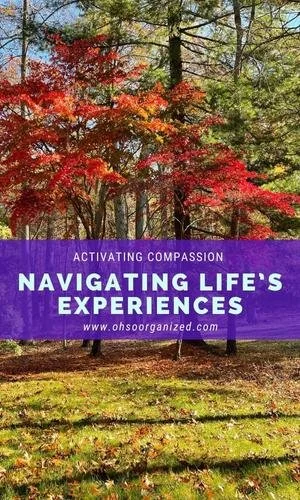As the holiday season arrives, there is much to be grateful for. There are gatherings and celebrations to look forward to with your favorite humans. There are moments of simple ordinary joy like taking your first sip of hot coffee in the morning, crossing off a task from your to-do list, or receiving an encouraging message from a friend. When things are going well, gratitude comes easily, and you lean into those positive feelings. What happens when you experience unpleasantness, inconveniences, or heartbreak? Are you able to navigate with compassion and patience?
I’m having a terrible moment, although I recognize it’s fixable and will pass. My computer is giving me BIG trouble. Yes. I talked with tech support and am working on the problem. There’s more to do, but I guess it’s time to replace my computer. This is not something I want to do right now, but it’s also no fun having my computer crash continually, go as slow as molasses, and not be able to handle the work I do each day. Time, the most precious commodity, is being wasted. My frustration levels are increasing.
During the educational NERCPO conference this weekend, presenter Rubina Motta spoke about productivity and eliminating waste in your processes. She said waste is “anything that adds cost or time without adding value.” Was she talking to me? Rubina explained the “seven deadly wastes,” of which “waiting” was one of them. I understand how waiting is essential and unavoidable at times. However, waiting for my computer programs to load while the multicolored wheel spins or reboots because the computer froze again, I could do without.
There’s a quote by author L.R. Knost, who shares a perspective about life that is both realistic and hopeful. She said,
“Life is amazing. And then it’s awful. And then it’s amazing again. And in between the amazing and awful it’s ordinary and mundane and routine. Breathe in the amazing, hold on through the awful, and relax and exhale during the ordinary. That’s just living heartbreaking, soul-healing, amazing, awful, ordinary life. And it’s breathtakingly beautiful.”
“Breathe in the amazing, hold on through the awful, and relax and exhale during the ordinary. ”
I love Knost’s advice, which I’m going to follow right now.
I will breathe in the amazing as I . . .
Marvel at the deep rich red maple leaves dotting the fall landscape
Spend time with my loved ones
Walk along the river and in the woods
Enjoy the flavors, textures, and scents of the foods I eat
Hear music that makes me well up with emotion
What amazing things will you breathe in?
I will hold on through the awful as I . . .
Figure out what tech steps are needed next
Grieve for the family and friends who have passed
What awful things are you navigating?
I will relax and exhale during the ordinary as I . . .
Do my daily mindfulness meditation
Practice yoga
Journal
Brush my teeth
Shower
Organize my days
Get into bed at night
What ordinary things are you relaxing into?
Life is a mix of emotions, experiences, joy, heartbreak, and more. Some days are more challenging than others. Extend extra compassion to yourself as you navigate life’s ups and downs. Breathe, hold on, and relax through all that is before you. What are you noticing now? What is your time and attention feeding? I’d love to hear your thoughts. I invite you to join the conversation.














